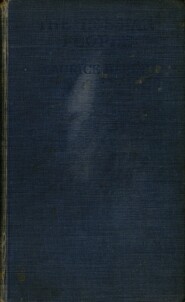По всем вопросам обращайтесь на: info@litportal.ru
(©) 2003-2024.
✖
Passing By
Настройки чтения
Размер шрифта
Высота строк
Поля
Christmas Day.
Dined at the Club.
Tuesday, December 28th.
Tuke telephoned to say not to forward any more letters to A. He was on his way home.
Saturday, January 8th, 1910.
Received a letter from A. from his sister's house. He is coming up next week. Riley has written to me from Paris to know whether I could put him up next month. He is going to spend a month in London. I have told him I would be glad of his company.
Letters from Guy Cunninghame to Mrs Caryl
ROSEDALE,
Saturday, January 1st, 1910.
DEAREST ELSIE,
I have been staying with Lady Jarvis for Christmas. There is a very small party, only Jane Vaughan and Winchester Hill besides myself. Just before I came down here Housman asked me to dine with him at the Carlton. I went and he was alone. After talking nervously on ordinary topics, he told me he did not know what to do. It gradually came out that Mrs Park is making his life quite unbearable. She won't let him see any of his friends; she quarrels with Sarah, and has the most violent scenes; she makes scenes every day, and not long ago, he said, broke a fine piece of Venetian glass. He is miserable; he says he can't call his soul his own. I told Lady Jarvis all about this and she said the only thing to be done would be for Housman to get Mrs Housman to come back. She has been away two months, and if she comes back at the end of the month the worst of the winter will be over. She is very much worried about Mrs Housman and says this is most unfortunate, as it would be better really in every way if she were to stay out there. You see Edith and Mrs Campion and Freda all think that it is only a passing fancy of George's and that he will get over it and marry Lavinia Wray! Lady Jarvis says this is wrong; she knows they are wrong. She thinks George and Mrs Housman are desperately in love with each other and she doesn't know how it will end. She is so worried that she nearly went out to Florence last week. She had heard from Mrs Housman quite lately. She said in her last letter that George had suggested coming out to Florence for Christmas with Mrs Campion. She had told him that she would most likely not be in Florence as the Albertis had asked her to spend Christmas with them at Ravenna; she was not sure, however, whether she would go or not. Whether George went or not, I don't know. He told me he was going to spend Christmas with Mrs Campion at the Priory.
I am going back to London at the end of next week.
Yrs.
G.
LONDON,
Wednesday, January 11th.
DEAREST ELSIE,
I came back to London on Monday. I asked Housman to dinner with me and told him that he had much better get Mrs Housman back. He said he quite agreed that it was the only thing to do. Things were now worse than ever. Mrs Park was impossible. Poor little "Bert"! The worst of it is, that directly this is over there is quite certain to be someone else and perhaps someone worse. However, let us hope for the best. George came to the office yesterday. He said he had been staying with his sister; he said nothing about Florence. He is in low spirits.
I shall certainly go abroad at Easter and spend a few days in Paris in any case. Lady Jarvis is back in London, and the Shamiers. I dined there last night. Lavroff was there and Louise is just as fond of him as ever.
Poor Godfrey Mellor is terribly melancholy. He has got a friend staying with him now and I don't see much of him.
Yrs.
G.
From the Diary of Godfrey Mellor
Tuesday, February 15th, 1910.
Alfred Riley arrived last night. He is now professor at Shelborough University and is editing Propertius. He has come to consult some books at the British Museum.
Wednesday, February 16th.
Sat up very late last night talking with Riley. He was amused by a conversation he had overheard at a Club. Two men were talking about someone who had become a Roman Catholic. Someone he didn't know. One of them said to the other that it was a very pleasant solution if you could do it. The other one said: "Certainly; no bother, no responsibility … everything settled for you." I said that I did think the Confessional must be the negation of responsibility. Riley said that by becoming a Catholic you became responsible for all your actions. He said that before he was a Catholic he felt no responsibility at all to anything or anyone, but that the moment you were a Catholic everything you did and said counted. Every time you went to Confession you acknowledged and confirmed your assumption of responsibility. I mentioned a common friend of ours, O'Neil, who had been a Catholic all his life and who, though he was married, had never ceased to live with a Miss Silvia Thorpe, whom I had known as an artist. He didn't hide it, neither did she. Riley said that this proved his point. O'Neil never dreamt of going to Confession; he knew it would be useless, because he had no intention of giving up Miss Thorpe, and that being so, he knew he couldn't get Absolution, It was a sacrifice to him, a very great sacrifice, as he Was a believing Catholic. "That shows," he went on, "that you don't understand how the thing works. You and all Protestants think that one can stroll into the Confessional, wipe the slate clean and go on with what you are doing, however bad it is, with the implied sanction of the Church. But the fact remains that practising Catholics who are living in a way which the Church condemned do not go to Confession. Going to Confession entails facing responsibility instead of evading it." He said that if what I thought was true, people like O'Neil would go to Confession. I must face the fact that he did not go to Confession and was extremely unhappy on that account. He would like to go to the Sacraments but he had made this great sacrifice with his eyes open. I said that I had always thought the Church was lax about such matters. He said individuals might be lax. The Church was not responsible for the conduct of individuals, but the rule of the Church was absolutely uncompromising. I said O'Neil might be an extreme case, but supposing a devout Catholic married woman had a great man friend, supposing he was very much in love with her, but she was a virtuous woman, faithful to her husband, she could go on seeing the other man as much as she liked? Would the Church forbid it? Riley said the Church would forbid sin. Any priest would tell her that if she thought it might lead to sin, she must cut it out of her life. I said that was quite clear, but he was not telling me what I wanted to know. He said: "What is it that you want to know?" I said I must give it up. I couldn't put it into words. I said Roman Catholics were always so matter-of-fact. They handed one opinions and ideas like chocolates wrapped up in silver paper. He said: "You think that, because you would sooner walk naked in the streets than think things out, or call things by their names. You like leaving them vague. 'Le vague,' Renan said, 'est pire que le faux.'"
I said, going back to the question of responsibility, that I had often heard Catholics themselves complain of the want of responsibility of Catholics. Riley said that might very well be; they might lack a sense of responsibility, just as they might lack a sense of charity or honesty. "You think," he said, "that the Church is perpetually arranging comfortable compromises. Nothing is further from the truth. Nothing is harder on the individual than certain of the commandments of the Church with regard to marriage: for instance, divorce, and the bearing of children. Some of the Church's views were just as hard on the individual as it was hard on a man, who is going to catch a train to see his dying child, to be delayed by a policeman holding up the traffic, but in order to make traffic possible, you had to have a policeman, and the individual couldn't complain however much he might suffer.
"I know a much harder case than O'Neil's," he said: "a colleague of mine who is married and has been completely neglected by his wife. On the other hand, he has been looked after devotedly for years by another woman, who nursed him when he was ill and saved his life. He wants to become a Catholic, but he knows quite well that the Church will not receive him unless he were to give up this woman, whom he adores, and go back to his wife, who is indifferent to him. What you don't understand," he said, "is that the Church is not an air cushion but a rock."
He said I accused the Church of being lax, but many people that he knew found fault with what they called the hardness of the Church. But as a matter of fact they had generally to admit that as far as the human race was concerned the Church in such matters of morals was always right. He cited instances of what the Church was right in condemning. I said that one did not need to be Roman Catholic to know that immorality was bad for the State, and that vice was noxious to the individual. The ordinary laymen reach the same conclusions merely by common-sense.
Riley said there were only two points of view in the world: the Catholic point of view or the non-Catholic point of view. All so-called religions which I could mention, including my layman's common-sense view, were either lopped-off branches of Catholicism or shadows of it, or a blind aspiration towards it, or a misguided parallel of it, as of a train that had gone off the rails, or a travesty of it, sometimes serious, and sometimes grotesque: a distortion. The other point of view was the materialist point of view, which he could perfectly well understand anyone holding. It depends, he said, whether you think human life is casual or divine.
I said I could quite well conceive a philosophy which would be neither materialist nor Catholic. He quoted Dr Johnson about everyone having a right to his opinion, and martyrdom being the test. Catholicism, he said, had survived the test; would my philosophy?
As far as I was concerned I admitted that I held no opinion for which I was ready to go to the stake, except, possibly, that Jane Eyre was an interesting book.
Monday, February 21st.
I heard from Mrs Housman this morning. She returns to-morrow.
Saturday, February 26th.
Called on Mrs Housman, and found her in. Housman was there also. They asked me to dinner next Monday.
Sunday, February 27th. Rosedale.
I am staying with Lady Jarvis. There is no one else. Lady Jarvis said she was glad Mrs Housman had returned to London.
Letter from Guy Cunninghame to Mrs Caryl
LONDON,
Tuesday, March 1st.
DEAREST ELSIE,
I dined with the Housmans last night. Only myself, Miss Sarah, Lady Jarvis, and Godfrey Mellor. Everything as it used to be. Carrington-Smith came in after dinner. He has not been inside the house for months. I don't know what Mrs Housman did nor how it was done, but it was done, and done most successfully and quickly! She only came back a week ago. "Bert" looks quite different and is perfectly radiant.
George, I gather, hasn't seen her. They asked him to dinner last night, but he had an official dinner and couldn't come. He asked me whether I had seen her. He said he had been there several times, but she had always been out. He is still most depressed and goes nowhere unless he is absolutely obliged to. The Housmans have asked me to spend Easter at their villa. Lady Jarvis is going, and Godfrey; and Housman told me he was going to ask George. I am going and I shall stop two or three days in Paris on the way.
Lavinia Wray has gone to the south of France with her aunt. The Shamiers are going to Paris next week. They will tell you all the news, not that there is much.
Yrs.
G.
From the Diary of Godfrey Mellor
Monday, February 28th.
A. told me he had not been to the country after all on Saturday.
Tuesday, March 1st.
Dined with the Housmans, a very agreeable dinner. Mrs Housman played and sang after dinner: Brahms' Lieder, and some Grieg.











